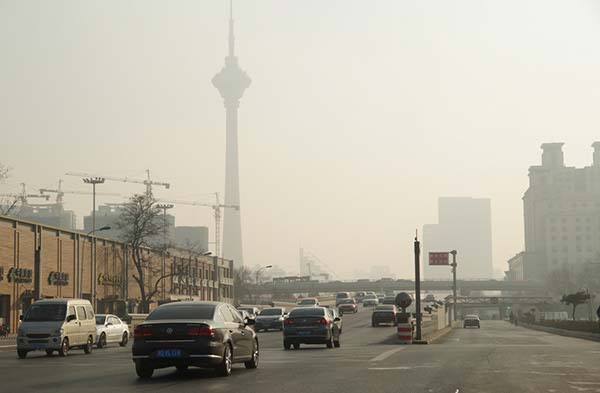More limits to come, green cars among likely winners
Smog was a frequent feature on daily weather reports in cities throughout China in 2013.
Beijing was blanketed in smog for at least half a month in September and October, typically months when the capital sees less smog because of favorable atmospheric conditions.
 Tianjin's new lottery system for car license plates aims to battle both traffic jams and air pollution. [Zhan Xiaoren / For China Daily] |
And according to a Xinhua report, Tianjin experienced 200 days of hazardous air pollution.
Local authorities have vowed to clean the air, and vehicles, one of the primary sources of pollutant, will bear the brunt of any new actions.
In November, the Beijing government announced it would begin reducing the number of private license plates issued in 2014.
One month later, the Tianjin government introduced a lottery system for awarding licenses, making Tianjin the sixth city nationwide to place limits on the number of vehicles.
A rule barring cars from the roads on certain days based on the last digit of their license plates will go into effect in the city in March.
According to a Xinhua report, local authorities blame exhaust for pollution in Tianjin, saying it contributed 16 percent of its PM 2.5 pollutants in the past year.
PM 2.5 refers to particulate matter no larger than 2.5 microns.
Dubious about the effects, many residents complain that one of the most immediate results is inconvenience, arguing that Tianjin's public transit is not as well developed as other large cities like Beijing or Shanghai.
Different voice
"I do not think the policy is advisable. I would rather recommend the government invest to improve public transport," said Mu Liang, a 33-year old bank clerk in Tianjin.
Mu said there is not a subway station near her apartment and the nearest bus station where she can find a bus to her job is a 15-minute walk away. "It takes more than one hour in the morning and even more in the evening as the bus is not always so punctual."
Mu said she actually needs a car, adding that "it has nothing to do with showing off ".
Mu's husband works in Beijing.
The couple planned to buy a car in the capital city, but they failed to win the lottery.
When they finally decided to purchase one in Tianjin, they found that they had to try their luck again in a similar lottery system that has been put in place.
Mu said she knew the system would be introduced but never expected it would come so soon.
"My boss learned the news in advance from a friend in the local transport administration. I should have listened to him."
She said her boss bought two second-hand cars before the lottery system took effect, and she is considering buying one from her boss, even at a higher price.
"Otherwise, there is no doubt that I will not have a car in the foreseeable future," said Mu.
Meanwhile, local authorities in nearby Shijiazhuang, capital of Hebei province, also promulgated policies in June to curb the number of private cars in the city.
